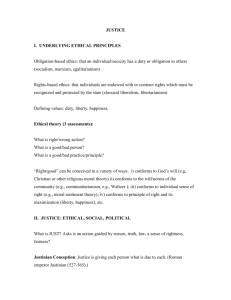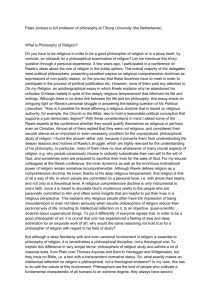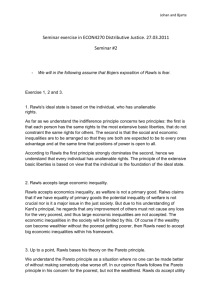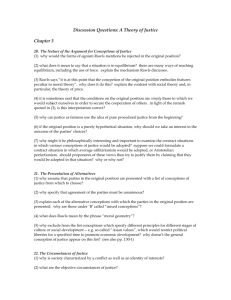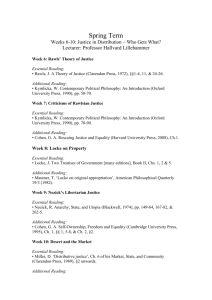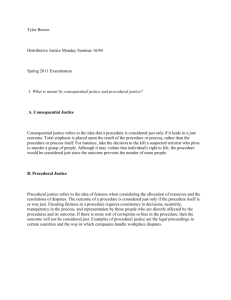Seminar essay Monday 4 April
advertisement
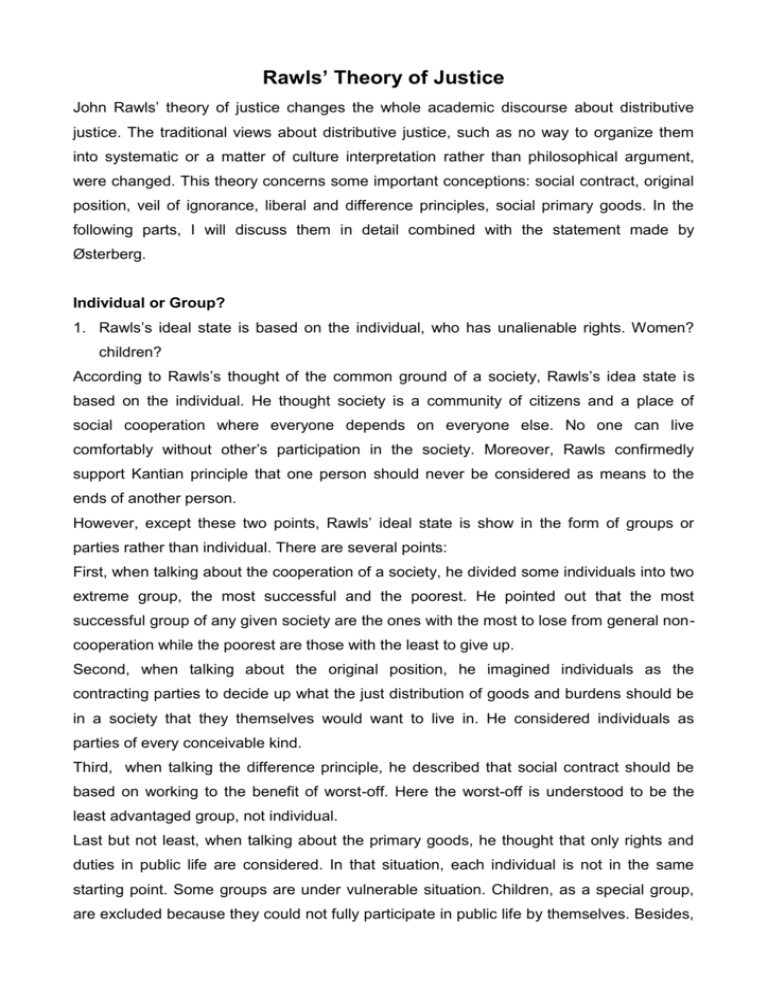
Rawls’ Theory of Justice John Rawls’ theory of justice changes the whole academic discourse about distributive justice. The traditional views about distributive justice, such as no way to organize them into systematic or a matter of culture interpretation rather than philosophical argument, were changed. This theory concerns some important conceptions: social contract, original position, veil of ignorance, liberal and difference principles, social primary goods. In the following parts, I will discuss them in detail combined with the statement made by Østerberg. Individual or Group? 1. Rawls’s ideal state is based on the individual, who has unalienable rights. Women? children? According to Rawls’s thought of the common ground of a society, Rawls’s idea state is based on the individual. He thought society is a community of citizens and a place of social cooperation where everyone depends on everyone else. No one can live comfortably without other’s participation in the society. Moreover, Rawls confirmedly support Kantian principle that one person should never be considered as means to the ends of another person. However, except these two points, Rawls’ ideal state is show in the form of groups or parties rather than individual. There are several points: First, when talking about the cooperation of a society, he divided some individuals into two extreme group, the most successful and the poorest. He pointed out that the most successful group of any given society are the ones with the most to lose from general noncooperation while the poorest are those with the least to give up. Second, when talking about the original position, he imagined individuals as the contracting parties to decide up what the just distribution of goods and burdens should be in a society that they themselves would want to live in. He considered individuals as parties of every conceivable kind. Third, when talking the difference principle, he described that social contract should be based on working to the benefit of worst-off. Here the worst-off is understood to be the least advantaged group, not individual. Last but not least, when talking about the primary goods, he thought that only rights and duties in public life are considered. In that situation, each individual is not in the same starting point. Some groups are under vulnerable situation. Children, as a special group, are excluded because they could not fully participate in public life by themselves. Besides, Rawls considered family belonging to private life in stead of public life. Under this division, women, as another group, are not treated fairly because they usually contribute more to the family which leads to inequality distribution of primary goods for women. Difference principles 2. Rawls accepts large economic inequality. 3. Up to a point, Rawls bases his theory on the Pareto principle. For question 2 and 3, Both of them are related with the difference principle. Rawls accepts large economic inequality. But there is a premiss. The inequality must be worked to the advantage of the worst-off. Income earned by Bill Gates per minute is much higher than that was earned by a common American worker per year. It was acceptable by Rawls since American society has a tax system which will transfer part of fortune made by Bill Gates to the worst-off. That is to say, if a society have set up a system to guarantee people who gain from their good fortune will also bring benefit for the advantage of the worst-off, then inequality, even large inequality is acceptable. From the above analysis, we could say that Rawls’ theory fulfill Pareto principle. However, except Pareto principle, Rawls’ theory is also based on original position and liberal principle which will be discussed deeply in later questions. Original Position-Mutually disinterested 5. Rawls makes a mutually disinterested rationality the basis of life-choices. The original position, postulated by Rawls, is a state when social members meet together to make an agreement on social contract. In this original position, the contracting parties are ignorant of their age, sex, talents etc. as if they are behind a veil of ignorance of their own position when they negotiate the agreement on the one hand. On the other hand, all participants have a good understanding of legal, economic, political and social affairs and they know how to organize an institutional society. The conception of original position aims at making parties mutually disinterested and hiding parties’ own particular circumstances so that it will ensure a social contract that guarantees impartial justice. Does Rawls’ assumption about “mutually disinterested” reflect how people behave in real life? Or is it his way of describing the theoretical original position? As Hilde mentioned, “the original position is not a description of human behavior or of any situation that has actually occurred.” But it acts as a tool to guide living human beings to reason about the just society in the long run. The purpose of making the contracting parties ‘mutually disinterested’ is to ensure a consent-based and benefit-based social contract. In that case, the rational self-interest of every single human being is equally taking into account which makes the agreement close to the Rawls’ ideal social contract. The Incentives of Social Contract 6. It seems as if Rawls imagines that the most well-to-do will share their wealth with the rest of society From the difference principle, we could see that Rawls considered that the most well-to-do will share their wealth within the appropriate designed society. Is this sharing behavior a coercion or of one’s own free will? In my opinion, under a just institutional arrangement society, two reasons promote the most well-to-do sharing their wealth: 1) Cooperation As I mentioned above, Rawls said that everyone’s well-being depends upon a scheme of co-operation without which no one could have a satisfactory life. Further more, the most successful members are the ones with the most to lose from general non-cooperation. So the most well-to-do have incentives to secure the voluntary cooperation of the least successful. In Rawls’ words, the division of advantages should be draw forth the willing cooperation of everyone taking part in it, including those less well situated. 2) Endowments Persons born into society are at some particular position and with different endowments. At the same time, it is the society provides the platform for people with different endowments to make achievement. Therefore, we don’t own ourselves in society. The success of most well-to-do not only belongs to their gift, but also depends on the beneficiary circumstance to them provided by the society. To some extent, the society helps them to achieve their success. What’s more, helping the less fortunate will further strengthen the cooperation of society by which the most well-to-do could benefit more from this cooperation on the one hand, and prove and consolidate their advantage position on the other hand. Ambition Sensitive 7. The difference principle implies that something should be done for the worst off, not that they themselves organize to improve their lives. The difference principle aims at making up imbalance brought by natural distribution. It doesn’t mean that what the worst off need to do is to wait assistance. Difference principle provides a justice way for institutions to deal with natural facts. With admission of different natural facts, difference principle tries to give equal opportunity to all; tries to create equal environment; tries to create equal starting line. All of these efforts support ‘ambitionsensitive’, admire hard work, encourage self-supporting, and avoid the advantage taking over the worst off. However, the Difference Principle is criticized not ‘ambition-sensitive’ enough and that provided people have equal resources they should live with the consequences of their choices. For instance, People who choose to work hard to earn more income are required to subsidize those choosing more leisure and hence less income. This issue was discussed a lot in Dworkin’s resource-based principles. Here we don’t talk further. Original Position-Monological? 4. The Pareto principle is best suited to cattle, that do not communicate. There are many criticisms towards Rawls’ theory. On of them is that Habermas considered, in Rawls’ theory, there was no plurality of voices and points of view represented, i.e. the parties in the original position were several copies of one single human being. The criticism seems correct since the parties in original position are without individual traits or characteristics beyond being human. But this assumption aims at providing a guide on how to make agreement in a long run. In fact, every conceivable kind of human being has been taken into account for understanding the general fact about human society during the process of agreement making. And in real life, engaging in conversation or exchanging points of view are the most common way to make Pareto principle into practice. Rawls’ just society or Scandinavian Welfare States? 8. Give the choice between Rawls’ just society and the Scandinavian welfare states, most people would prefer the latter Like the most people, compared with Rawls’ just society and the Scandinavian welfare states, I would prefer the latter. There are several reasons: 1) Egalitarian and extensive benefit levels In Norwegian Jante Law, there is a rule said that you shall not behave as if you are better than others. In Scandinavian welfare states, everyone are treated equally although they have different social positions and endowment. Moreover, free public education system, social security net, public health insurance and birth leave are policies effectively narrow down the gap between the well-to-do and the poorest. 2) Gender equality Scandinavian welfare states have realized the goals of equality between men and women in a better way. In these countries, women’s contribution to the family is high respective. Men tend to share housework with women. In public life, there is a quite broad agreement that equal representation is important. 3) Large magnitude of redistribution High tax rate in the Scandinavian welfare states not only lead to fair society, but also increase social dialogue, collaboration and trust among people which are important factors for explaining the high productivity and wage growth. 4)Incentives to work Scandinavian welfare states are not only famous for their equality, but also good at maximizing labour force participation. The reason is that in these states, most benefits highly related to the working experiences. For example, both disability insurance and retirement pensions increases dramatically if you have been working. With this kind of incentive, Scandinavian welfare states keep a good recored on sustainable development.


